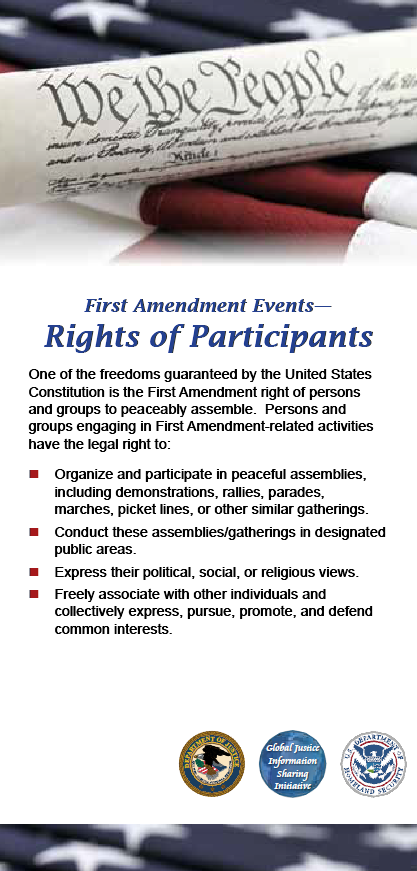The following pamphlet was issued by the Department of Justice’s Bureau of Justice Assistance and the Department of Homeland Security in 2011. The pamphlet was released along with a longer report on Law Enforcement Guidelines for First Amendment-Protected Events.
Responding to First Amendment-Protected Events—The Role of State and Local Law Enforcement Officers Training
- 2 pages
- October 2011
First Amendment Events—Rights of Participants
One of the freedoms guaranteed by the United States Constitution is the First Amendment right of persons and groups to peaceably assemble. Persons and groups engaging in First Amendment-related activities have the legal right to:
- Organize and participate in peaceful assemblies, including demonstrations, rallies, parades, marches, picket lines, or other similar gatherings.
- Conduct these assemblies/gatherings in designated public areas.
- Express their political, social, or religious views.
- Freely associate with other individuals and collectively express, pursue, promote, and defend common interests.
The Role of State and Local Law Enforcement at First Amendment Events
As part of their law enforcement duty to uphold the United States Constitution, state and local law enforcement officers have the responsibility to protect persons engaged in their First Amendment right to peaceably assemble. Public safety is the primary mission of officers assigned to these types of events, and as a part of this mission:
Officers will:
- Protect life and property.
- Ensure that all privacy, civil rights, and civil liberties protections are upheld.
- Practice fair and impartial enforcement of laws, statutes, and ordinances.
- Adhere to the event Operations Plan, unless otherwise directed by supervisors. Expanded activity should not be conducted without supervisory approval unless criminal activity is identified by the officer.
- Enforce reasonable time, place, and manner restrictions as discussed in the Operations Plan.
Officers should not:
- Engage in unauthorized enforcement activities, including unauthorized information collection.
- Document information on persons solely on the basis of:
- Ethnicity, national origin, or race.
- Religious, political, or social beliefs or associations.
- Sexual orientation.
- Support for unpopular causes.
- Conduct investigative activity without direct supervisory authorization or unless criminal activity is identified by the officer.
- Allow personal beliefs and opinions to interfere with their duties as a law enforcement officer.
- Express personal, political, or religious views during the assembly while on duty.
- Infringe on any person’s right to peaceably assemble and associate with others.

